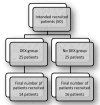Achieving Neuroprotection in the Setting of Early Extubation During Infant Cardiac Surgery: A Prospective, Randomized, and Blinded Study
- PMID: 40370628
- PMCID: PMC12074690
- DOI: 10.14740/cr2029
Achieving Neuroprotection in the Setting of Early Extubation During Infant Cardiac Surgery: A Prospective, Randomized, and Blinded Study
Abstract
Background: This study aimed to investigate the impact of early extubation on stress response and neurodevelopmental outcomes after pediatric cardiac surgery utilizing cardiopulmonary bypass (CPB).
Methods: In this single-center prospective pilot study, we attempted to study the impact of using dexmedetomidine as an adjunct to facilitate early extubation after pediatric cardiac surgery requiring CPB during the first year of life. The study was conducted between May 2014 and January 2020. Perioperative data and stress hormone levels were collected at different points during the perioperative period. In addition, neurodevelopmental outcome measures including cognitive composite score, language (expressive and receptive) and motor (fine and gross) composites were evaluated at five time points including prior to surgery and up to 1 year after the procedure. Two-sample t-tests and Kruskal-Wallis tests were used to compare continuous parametric and non-parametric outcomes, respectively. Fisher's exact or Chi-squared tests were used to compare categorical outcomes.
Results: A total of 30 subjects were included in the final cohort of patients. Of the 30 subjects, 14 patients were randomized to the dexmedetomidine group (dexmedetomidine plus fentanyl) (DEX group) and 16 patients were randomized to the no dexmedetomidine group (fentanyl only) (no DEX group). With few exceptions, both groups demonstrated appropriate blunting of the stress response. There was a significant increase in the ratio of the pro-inflammatory interleukin-10 (IL-10) to the anti-inflammatory interleukin-6 (IL-6) for the no DEX group at the end of the procedure when compared to the DEX group (10 ± 9 vs. 5 ± 4, P = 0.04). When looking at the Bayley cognitive composite score, the DEX group scored better than the no DEX group during the second visit (102 ± 11 vs. 88 ± 17, P = 0.023). By the fifth visit, the two groups scored similarly (94 ± 12 vs. 94 ± 12, P = 0.9 for the no DEX and DEX groups, respectively).
Conclusion: When looking at the neurodevelopmental outcome, both groups had no significant changes in their Bayley scores from baseline with blunting of most stress markers. This study offers possible evidence of the safety of early extubation after pediatric cardiac surgery while maintaining the goal of neuroprotection.
Keywords: Early extubation in pediatric cardiac surgery; Fast tracking; Neurodevelopmental outcome; Stress response.
Copyright 2025 Authors.
Conflict of interest statement
The authors declare that there is no conflict of interest.
Figures
Similar articles
-
The role of different anesthetic techniques in altering the stress response during cardiac surgery in children: a prospective, double-blinded, and randomized study.Pediatr Crit Care Med. 2013 Jun;14(5):481-90. doi: 10.1097/PCC.0b013e31828a742c. Pediatr Crit Care Med. 2013. PMID: 23644384 Free PMC article. Clinical Trial.
-
The effect of dexmedetomidine on neuroprotection in pediatric cardiac surgery patients: study protocol for a prospective randomized controlled trial.Trials. 2022 Apr 8;23(1):271. doi: 10.1186/s13063-022-06217-9. Trials. 2022. PMID: 35395776 Free PMC article.
-
Neurodevelopmental outcome after cardiac surgery utilizing cardiopulmonary bypass in children.Saudi J Anaesth. 2015 Jan;9(1):12-8. doi: 10.4103/1658-354X.146255. Saudi J Anaesth. 2015. PMID: 25558192 Free PMC article.
-
Use of dexmedetomidine in pediatric cardiac anesthesia.Curr Opin Anaesthesiol. 2019 Jun;32(3):334-342. doi: 10.1097/ACO.0000000000000731. Curr Opin Anaesthesiol. 2019. PMID: 30893120 Review.
-
Effectiveness of dexmedetomidine versus propofol on extubation times, length of stay and mortality rates in adult cardiac surgery patients: a systematic review and meta-analysis.JBI Database System Rev Implement Rep. 2018 May;16(5):1220-1239. doi: 10.11124/JBISRIR-2017-003488. JBI Database System Rev Implement Rep. 2018. PMID: 29762314
References
LinkOut - more resources
Full Text Sources





